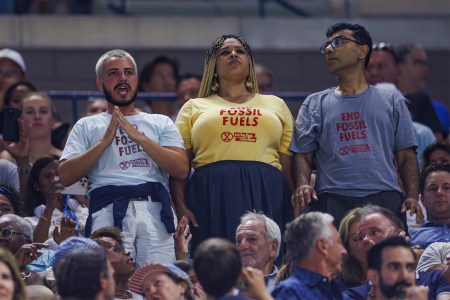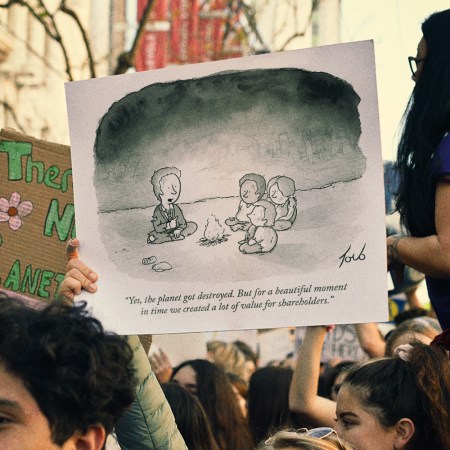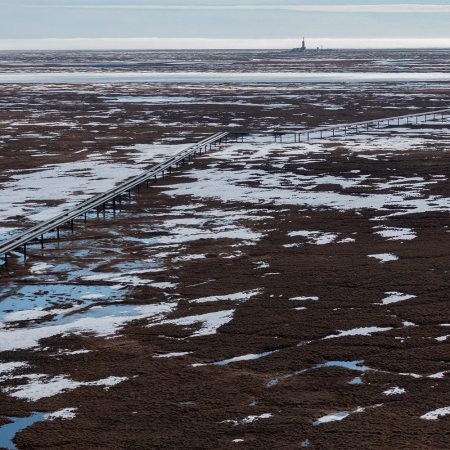John Kerry was optimistic about Sultan Ahmed al-Jaber. In January 2023, when the latter was announced as the president of COP28, the United Nations’ annual climate change conference currently underway in Dubai, Kerry suggested in an interview that al-Jaber’s position as the CEO of the United Arab Emirates’ state-run oil company wasn’t a conflict of interest. In Kerry’s mind, being an oil magnate actually made him uniquely qualified to lead global discussions around thwarting the climate crisis.
“I think that Dr. Sultan al-Jaber is a terrific choice because he is the head of [Abu Dhabi National Oil Company (Adnoc)]. That company knows it needs to transition,” Kerry, the U.S. special presidential envoy for climate, said at the time. “He knows — and the leadership of the UAE is committed to transitioning.”
In a world that largely runs on fossil fuels (82% of global energy consumption in 2022), Kerry’s position has become a popular pitch: bring the oil, coal and gas companies into the fold, as they are the ones who can bring about change the fastest (by cutting production), and can be persuaded to move their business to renewable energy because they have the money and means to invest in the massive transition.
We’re only five days into the two-week COP28 and this optimistic mindset has already been shown for what it really is: naive.
Three days ahead of the summit, the BBC reported on leaked documents that showed the UAE planned to discuss fossil fuels deals with 15 nations during the most important international event focused on curbing fossil fuel use.
Actually, the US Open Is the Perfect Place for a Climate Protest
One activist glued his bare feet to the ground next to Honey Deuce-sipping fansThen, on Sunday, The Guardian reported on comments from al-Jaber that showed him not only sarcastically dismissing the expertise of Mary Robinson — former president of Ireland, chair of the Elders organization and climate advocate — but also dismissing the idea that fossil fuels need to be fully phased out in favor of renewable energy sources.
“Will you lead on phasing out — phasing out fossil fuel, with just transition?” asked Robinson during a virtual discussion for the group She Changes Climate, which occurred before the start of COP28 but flew under the radar.
“Like I said from the beginning, I accepted to come to this meeting to have a sober and a mature conversation,” al-Jaber said. “I’m not in any way signing up to any discussion that is alarmist. I am here factual and I respect the science, and there is no science out there, or no scenario out there, that says that the phase-out of fossil fuel is what’s going to achieve 1.5 [degrees Celsius]. 1.5 is my north star. A phase-down and a phase-out of fossil fuel, in my view, is inevitable. It is essential. But we need to be real, serious and pragmatic about it.”
When Robinson followed up, stating that Adnoc is still investing in new fossil fuel projects — which is not in line with the goal of keeping global warming to 1.5 degrees — al-Jaber cut her off, saying, “You’re reading your own media, which is biased and wrong. I am telling you I am the man in charge.”
While al-Jaber called the BBC’s reporting on the leaked documents supposedly showing Adnoc’s COP28 fossil fuel deals “false, not true, incorrect and not accurate,” Adnoc itself publicly states that the company is currently in the process of increasing its production capacity from about 4.5 million barrels of oil per day to 5 million a day by 2027. Adnoc attempts to sugarcoat its increase in fossil fuel production by stating this is “lower carbon-intensive hydrocarbons.”
In response to al-Jaber’s comments, Kerry didn’t backtrack on his support of the COP28 president. “Every decision we make should be geared to say, ‘does this advance the 1.5 degrees or is it going to be more destructive and take us in the wrong direction?’” he told CNBC. (A global temperature increase of 1.5 degrees Celsius above pre-industrial levels has been targeted as the goal for limiting the worst effects of climate change.)
In comparison, Al Gore, who is not part of the official U.S. delegation sent to COP28, had this to say about al-Jaber and fossil fuel companies: “This industry is way more effective at capturing politicians than they are at capturing emissions, and they have captured the COP process itself now and overreached, abusing the public’s trust by naming the CEO of one of the largest and least responsible oil companies in the world as head of the COP.”
Al-Jaber said the quiet part out loud by explaining his position that while phasing out fossil fuels may be inevitable some time in the distant future, he’s not interested in phasing out fossil fuels to reach the 1.5-degree target.
And why would he be? He’s in the oil business. His number one goal is making money from fossil fuels, and by convincing the world that continued investment in fossil fuel production is somehow part of a “pragmatic” transition away from fossil fuels, he’s shoring up his financial interests. While he has repeated the claim that he is aware of the science, which calls for “deep, rapid, and sustained reductions in greenhouse gas emissions,” per the Intergovernmental Panel on Climate Change’s sixth assessment report, it’s clear he’s not willing to let that science get in the way of Adnoc’s profits. Is he committed to the phasing out of fossil fuels eventually, as he said when attempting to clarify his comments? Possibly, but not without a number of asterisks that will allow continued oil investment and expansion during his tenure.
It’s the same story we’ve heard again and again: polluting industries, like Ford and General Motors in the automotive industry, have known about their massive contributions to human-caused climate change for a long time. But for these companies, it doesn’t pay to change their ways — it pays to keep the status quo.
In fairness to Kerry, it’s obvious why he isn’t slamming al-Jaber’s comments and actions as Gore is doing. At the COP summits, the point is to make global commitments to stem climate change, and because of the way COPs work, those commitments must be agreed upon by consensus. If there’s no consensus among all the nations involved, there’s no progress.
That said, the choice to install al-Jaber in the first place was a clear mistake. If there’s one good thing to come out of this COP, it’s the final nail in the coffin of the idea that fossil fuel companies will ever willingly take the necessary steps to address climate change with the seriousness it requires.
“Because the danger facing humanity is so grave, we can say very simply that there is a simple test of whether this COP will be a success or a failure,” Gore added. “If there is an agreement to phase out fossil fuels, it will be a success. If there’s not, it will be a failure.”
Don’t hold your breath.
This article appeared in an InsideHook newsletter. Sign up for free to get more on travel, wellness, style, drinking, and culture.




















